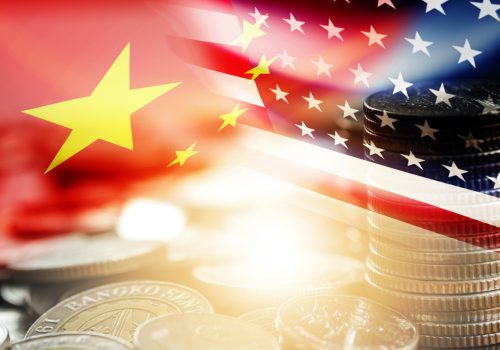What US outbound investment screening means for Transatlantic relations
This piece follows up on two previous articles by the author on the Chinese capital markets.
The European Commission recently announced that it will reexamine the European Union’s (EU) export control regime to determine if additional tools are needed regarding outbound strategic investment controls. Whether or not the EU will follow through with new outbound investment controls, and what those might look like, may not be purely determined by European deliberations. It will also depend on the evolution of American national security policy and transatlantic diplomacy.
US legislation enabling the review of outbound investment from the United States towards adversarial countries like China and Russia may pass soon. If the National Critical Capabilities Defense Act (NCCDA) is passed, increased US outbound investment review will likely impact the transatlantic relationship. Although the EU-China Comprehensive Agreement on Investment (CAI) was shelved in early 2021, some EU constituents still want to expand their investment relationship with China. Their appetite may be undermined by the NCCDA. The United States and the EU therefore need to carefully work with each other as they develop outbound investment screening mechanisms to prevent transatlantic tensions and conflict.
Extending US-EU cooperation into this area will be challenging, but not impossible.
The United States is highly motivated, having grown increasingly wary about the CCP’s hold over Chinese “private” businesses and the civil-military fusion approach which obliges Chinese “civilian” companies to share their technologies with the military-security industrial complex. US lawmakers have indicated that they want “to have a multilateral approach with partners and allies to ensure that [the United States] help them foster their development and implementation of similar, complementary mechanisms.”
The outward investment review is intended to prevent US capital from flowing towards America’s strategic competitors’ defense and security relevant sectors. The concern is not only that Chinese companies garner US capital, but that capital flows are accompanied by significant technological and knowledge transfers. The review would focus on technology companies, but it might be expanded to encompass other sectors relevant to national security, which can involve everything from steel manufacturing to banking and financial services.
The EU Commission’s announcement that it will explore outbound investment screening, seems to follow upon the prospect of US legislation passing soon.
Ideally, the American and European screening regimes should be developed in joint consultation. Why? The multilateralization of outbound investment screening is logical merely from a technical perspective. American capital, knowledge, and sensitive technology may be tied up in European companies, which can still invest in China, independently from US regulators. US legislation, once extant, may even have extraterritorial reach, automatically affecting European investors in China.
Previous US investment screening legislation already gave US authorities the capability to intervene in Chinese-European deals. For example, in 2017, the German lamp maker Osram had to get approval from the Committee on Foreign Investment in the United States approval for the sale of a part of its business to a Chinese group. The 2020 Foreign Investment Risk Review Modernization Act can prevent European private equity and venture capital funds from investing in US technology companies if they are co-funded by Chinese investors.
From a more strategic perspective, the multilateralization of outbound investment reviews is also advantageous. The United States wants to deny its adversaries’ national security complexes access to capital, knowledge, and technology from both the United States and US allies and partners—including the EU.
While clearly necessary, a transatlantic conversation about reviewing outbound investments may also lead to lengthy and sometimes frustrating negotiations. European financial and commercial interests and American national security policy do not always overlap. For example, US efforts to limit European business interactions with Russia over Nord Stream 2, with Iran through secondary sanctions, and with China over, chip manufacturing have led to significant fall-out.
In this case, difficulties may emerge on at least three levels: the interests of European businesses, the absence of European “national security” standards, and diverging strategic concepts.
Regarding European business interests, in early 2020, the EU-China Comprehensive Agreement on Investment seemed likely to pass. The EU only shelved the deal after significant pressure from the incoming Biden Administration. However, German businesses invested more than ever in China in the first half of 2022. Voices in favor of reviving the EU-China investment agreement remain strong. Chancellor Scholz’ recent trip to Beijing, accompanied by a large business delegation, was a case in point.
The second difficulty is that there is no single European system for investment screening and the screening standards are not harmonized, although the EU Commission can issue non-binding “opinions.” What is considered security-relevant in one EU member state may be ignored in another. A foreign investment in a specific kind of technology may be off-limits in France, while Swedish or Bulgarian authorities may allow such an acquisition to proceed. There is a growing need for a joint European understanding about the nexus of economics and security. Addressing this need could be the way forward to harmonize the European approach to foreign investment screening, inbound and eventually outbound.
Third, at the most profound level, the United States and the EU will have to reconcile their visions of world order, strategic competition with China, and how the management of capital markets, including outward investments, relates to this broader vision. Washington and Brussels need to get this conceptual question right at the start to prevent tensions from arising later on.
Brussels therefore has two options. Either it will passively await new US legislation and American diplomatic pressure, which may subject European investors in China and beyond to American rules and perspectives. Doing so may create significant tensions and harm the transatlantic relationship. Alternatively, the European Commission and European member states proactively prepare their own views on the geopolitical and security implications of European and Western investments in adversarial states like China.
The Commission now seems to be pursuing the second, better option but has yet to translate its geopolitical perspective on capital markets into policy proposals. But it takes two to tango. The US and the EU should engage with each other to work on a common understanding and, ideally, a joint approach to outbound investment screening. The better their mutual understanding on these issues, the more likely the United States and Europe are to commit to a truly transatlantic approach to strategic competition with China.
Dr. Elmar Hellendoorn is a nonresident senior fellow with the GeoEconomics Center and the Europe Center.

At the intersection of economics, finance, and foreign policy, the GeoEconomics Center is a translation hub with the goal of helping shape a better global economic future.
Image: blue european union EU flag on broken wall and half usa united states of america flag, crisis trump president and europe euro concept


